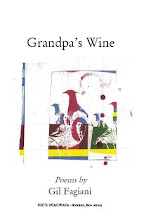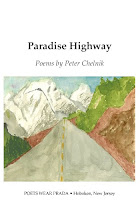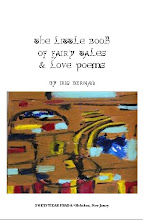
JOHN ON THE CHRYSLER Poems of Love and Grief Laura VooklesPoets Wear Prada Press, 533 Bloomfield St., Hoboken, N.J. 07030 2007, 17 pp., $6.25. |
| |
Smoke from a Marlboro cigarette trails through poems which, in a very tactile sense, evoke a poignant relationship between a Long Island guy and a woman from Memphis. "You can't go back, but the past counts," Laura Vookles writes. More than counts. As she must accept her husband's death, so she can't ignore his presence whenever she touches one of his many art acquisitions and feels his spirit move through her hand; those same "battered and calloused hands (that) sawed, chiseled, sanded and built a wooden locomotive and a sloop inside a museum" were the hands "carrying me to places I had never been." In "You are a Dream" the poet is telling her husband she is sure he still has a presence, that she felt it in something she filmed or photographed. While unclear about the details and who is even in it, she is not about his visible presence. In the dream she believes she's found tangible proof he's still here - "Even a candle snuffed leaves smoke / and a lingering scent." This is what she "wants to think." Needs to think. In touching his Rookwood vase "she feel[s] the lust that compelled [him] to own her," and asks, "How did the 'artist fade that pink to green / without the glazes melting into mud?" How does one love someone with her every breath, without it turning, into resentment afterwards? Surrounded by "ceramic lovers" the poet suddenly has an urge to smash, throw them against the wall. "I should feel more angry at you, / like I am at those Marlboros." The significant word here is, should. The rage to smash cannot be separated from their "piles of pointed shards - / sharp, like grief." What lit up their life together and his death that extinguished it, are intermingled in that wide range of emotion one goes through in grieving. This poem follows the more gentle and beautiful, "Sand in My Sheets": "If I ever find sand in my sheets, I will listen for you smoking in my kitchen. / Lighter click, a cough and then / the scrape of wood on tile as you return to me." Like the vase, the sand brings back what also reminds her is gone. Cars like art objects are important links to both the poet and her husband, as in the title poem, "John on the Chrysler" and in the collection's final, "Stick Shift Cool," in which she is driving a blue and white Mini Cooper she bought for him. She is "Pounding the wheel, head tossed back yelling - 'Look at me, John! I got this car for you!'" and imagines she heard him laugh. By the time we read the author's aside to her husband at the end of this collection, "Are you listening John? I wrote these poems for you?" she has convinced us what she intuitively, through a leap of faith, believes.. This is a highly recommended collection any reader cannot fail to be moved by. For those of us who've tried to make ourselves heard through the barrier of death, reach someone who is gone, these poems will especially resonate. |




































































No comments:
Post a Comment